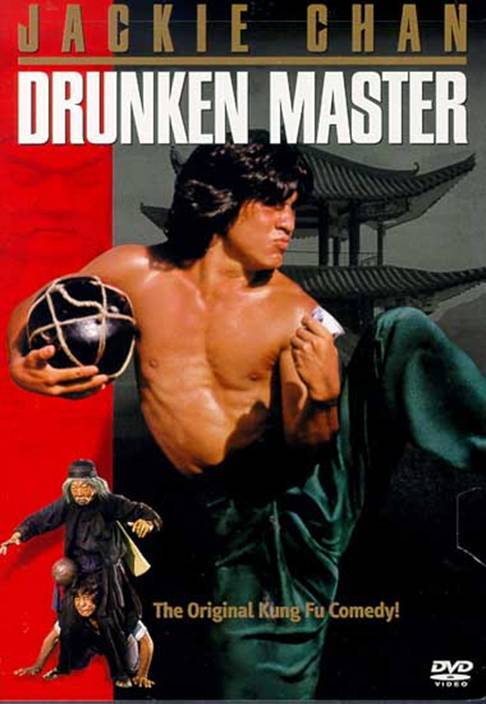| Roy Horan : Nearing the completion of Snake in the Eagle's Shadow, I had the chance to look at some of the footage, and told Ng See Yuen, “This movie should make some good money”. I also made a suggestion to him. Many foreigners, who first watch Chinese kung fu films, and see animal movements, think it's all too funny. They just laugh because they don't understand the theory behind the movements. So Ng See Yuen said “What can we do about that?” I suggested to film the fight between the cat and snake in order to tie the movements into the actual combat styles of animals. In that way, foreigners who see that scene, go “Aaah! OK, these moves are coming from animals that use them for attack and defence…kung fu fighters are just capitalising on that.” This bit of added information would help Western audiences to understand the reason why the Eagle School is dead against the Snake School.
 After the film was completed, I asked Ng See Yuen “How much can this film sell for?...worldwide, outside of the Far East ?” If I remember correctly, he said he will sell it to an agent in Hong Kong , who would then distribute it, and take some profit. If his own company managed to pull in UD$50, 000 on such a film, outside of Asia …that's a pretty good deal. I looked at him “Phfeww, US$50, 000 for the rest of the world seems pretty low!” He said, “There is not a big interest in martial arts films; the buyers are all small players; only small distributors handle these films.” Although it sounded reasonable to him, it didn't make much sense to me. I told Ng, “Well, I'm not very interested in acting but, if I'm here in Hong Kong , maybe I can help to sell the picture”. I had never sold anything before. In fact, I was next to a big fat “0” in terms of business experience. One day, however, an Indian buyer from the West Indies came into town. He was staying at a pretty mediocre hotel. Ng See Yuen, at the time, didn't like to work with foreigners very much….perhaps due to a perceived difficulty in communication. He said to me “There is this West Indies guy interested in the picture, why don't you go talk to him”. I said “OK.” I went over to the hotel; the buyer offers me a cup of tea and says “I like this movie, how much do you want for it?” After the film was completed, I asked Ng See Yuen “How much can this film sell for?...worldwide, outside of the Far East ?” If I remember correctly, he said he will sell it to an agent in Hong Kong , who would then distribute it, and take some profit. If his own company managed to pull in UD$50, 000 on such a film, outside of Asia …that's a pretty good deal. I looked at him “Phfeww, US$50, 000 for the rest of the world seems pretty low!” He said, “There is not a big interest in martial arts films; the buyers are all small players; only small distributors handle these films.” Although it sounded reasonable to him, it didn't make much sense to me. I told Ng, “Well, I'm not very interested in acting but, if I'm here in Hong Kong , maybe I can help to sell the picture”. I had never sold anything before. In fact, I was next to a big fat “0” in terms of business experience. One day, however, an Indian buyer from the West Indies came into town. He was staying at a pretty mediocre hotel. Ng See Yuen, at the time, didn't like to work with foreigners very much….perhaps due to a perceived difficulty in communication. He said to me “There is this West Indies guy interested in the picture, why don't you go talk to him”. I said “OK.” I went over to the hotel; the buyer offers me a cup of tea and says “I like this movie, how much do you want for it?”
- I asked, “How much do you want to pay for it?”
-
He says: “That's not how it works. You tell me how much you want for it, and I tell you how much I can pay”
-
I thought: “Oh..oh, I'm in trouble”
-
So, I said “I have another meeting right now…can I come back in 30 minutes?”
-
He was surprised, “But you have a meeting here with me! You've got another meeting?!”
-
“I'm sorry, I double-booked, it's a mistake, but the meeting is near by…I'll be back.”
I rushed to a nearby bookstore, looked up the West Indies in a big atlas, and studied the population statistics. I tried to gather as much data as possible in a few minutes, then did a quick calculation. Just cut everything in half, take another half of that, and so on…a quick calculation. For example, you get so much for a ticket…I estimated the ticket price as 50% of the ticket price in the US, that 50% of a certain kind of population will want to watch it, and distributors and cinemas will take their 50% cuts… After I did this down and dirty calculation, I went back to him and said I want US$ 90 000 for the film. He was shocked, “What ??!! Are you crazy??!!. Bruce Lee's films only get US$15,000 in the West Indies!” (laughs)
- “Well, that's what we are looking for…US$90 000.”
-
He said “You are insane; I can't talk business with you.”
- I told him, “That's what the picture's worth.” I then gave him some information about the West Indies , some geographical and market details he probably didn't know himself. (laughs) He was confused and said “Let me talk to my boss and get back to you tomorrow.” I go back the next day, he says “All right, we are going to make a special deal for you guys, we're gonna go US$30 000 on this film”.
I was thinking “Bruce Lee films are US$15 000…and they offer US$30 000 for Snake …they must really like the film.”
- I said “No, US$90,000.”
-
He said, “That's impossible! We can't do that”.
-
So I said “Well, we will just have to forget it then.”
- Once again, he said, “Let me talk to my boss.” Eventually, they came up with something like US$60,000.
-
Then, he asks, “How do you want us to pay?”
-
I said: “50%...cash!” You have to remember, I didn't know anything about business. I had never done a contract in my life. So, I went to the film association in Hong Kong, got a contract, looked down at it, made some wild guesses…like, the guy wanted the rights for 7 years, I put 5 years (laugh). I cut most things in half, though. I call it the rule of fifty (laughs). Finally, I told him “There are a lot of wealthy Indians in Hong Kong , I'm sure you can find the cash.”
Indeed, he signed the contract, and found the cash. Then I went to Ng's office, dropped the contract on his desk, and he immediately got pissed-off at me. “This contract is a fake contract. You just signed this contract on behalf of my company without asking for my authorisation... lalala…?” I said, “I'm really, really very sorry.”…then took out of my pocket all the cash and said, “You've just sold to the West Indies for the price of the entire world!”. He figured it was beginner's luck. Later, he tested me with a German buyer who was a much tougher negotiator. We bargained back and forth, and eventually did a pretty good deal with Germany. I continued doing deals in that way…then started to handle the overseas distribution for Ng. |
Roy Horan : I sold Snake in the Eagle's Shadow pretty well. Drunken Master soon followed. Since Snake in the Eagle's Shadow was successful, we had a host of hungry buyers. Some of the buyers called me ‘Iron Man' because I became such a tough negotiator. It wasn't that I was a real tough negotiator, I was just stupid about industry norms! (laughs) Well, not exactly. I also did marketing. That's probably what Hong Kong companies had never done before. They had not studied the overseas markets. They were only interested in what other films had sold for. Basic market research….that's what I did.
 When Drunken Master came along, of course, the selling price was higher. The major breakthrough was the territory of Germany . The Germans were extremely reluctant to pay high prices for Hong Kong films. Actually, distributors rallied together to keep the prices down. There was one Swiss distributor, however, who sent a representative to Cannes . He had never bought a Hong Kong film. The representative said “Hey, this is a great film.” I hit him with a real number for Germany . The Swiss distributor, when hearing the number, said to his rep, “Well, if you think the film's good enough, I'll pay it”. It completely pissed off a lot of the German distributors at the time. The guy put a lot of money into the promotion. He treated it like a big independent American film. And he also made good money…he was very, very happy with that. As a result, I later helped him to sell some of his own co-productions that starred actors like Ernest Borgnine, Lee Van Cleef, so forth. Once Germany broke open, the rest of the European market and people in the States could see something was happening. United Artists came in and bought all of South America for both of the Jackie Chan's films…and for a pretty good price. The films did excellent business.
Bit by bit, the business was building up. Around that time, we produced mostly martial arts films, but other Hong Kong companies had films like Aces Go Places. They produced action comedies. Their sellers went to the film market…some of them even made an effort to find out who my clients were…because, obviously, they were good paying clients. I even sat down with a few of the sellers and helped them understand how to generate good numbers. At the time, I began avoiding flat sales. It didn't take long to realize that there were such things as minimum guarantees and overages, and if you do a good contract with a good company, you will get the overages. I switched the flat sales model to the minimum guaranty model…plus, sold video rights, cable, and so forth on the same model…just like every American firm was doing. People from Hong Kong were getting on the bandwagon because “Hey! There is money overseas.” In the 80's, the video market was starting to build up. People were beginning to make very good money. |
